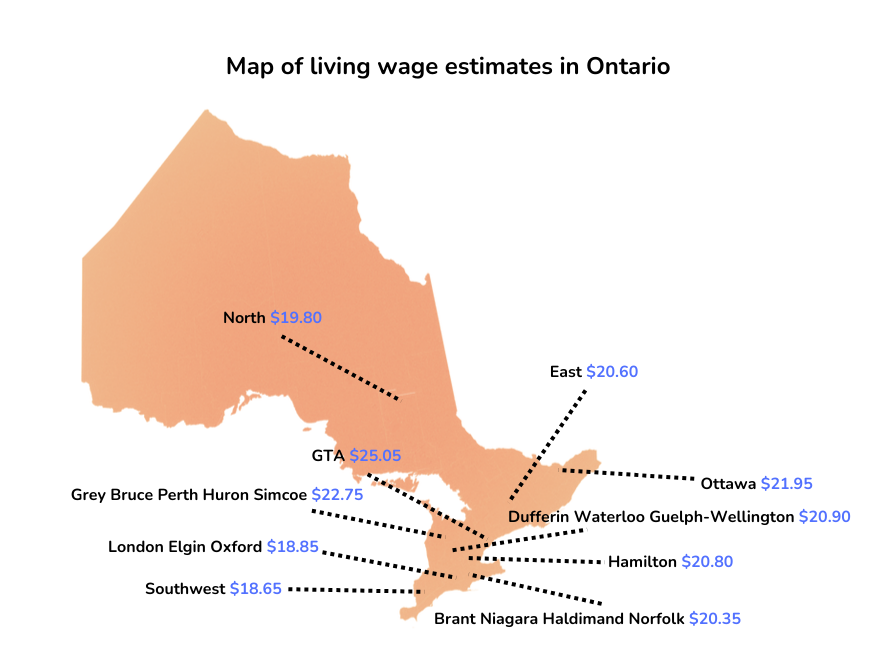
Listen to the full story here:
Three weeks after Ontario’s minimum wage increased to $17.20 per hour, reactions are mixed.
The increase announced Oct. 1 comes after three years of national above-target inflation, which has eroded living standards and made Canada — including Ontario and its biggest city, Toronto — largely unaffordable. The Bank of Canada targets two per cent for inflation, according to its website.
While workers will certainly enjoy the five per cent bump in pay from $16.55 an hour to $17.20, the Ontario Living Wage Network (OLWN) group says it amounts to a drop in the bucket.
“There’s just no place in Ontario where you can work a full-time minimum wage job and be expected to pay all your bills and make ends meet… even after the increase it’s just not enough,” said Craig Pickthorne, communications coordinator for the OLWN, which is a non-profit group that advocates for a higher minimum wage in Ontario.
“From 2018 to 2019, the Ontario minimum wage went up by 20 per cent. Businesses and advocacy groups said it was going to lead to mass layoffs and business closers, but next year the employment rate increased,” he said.
“Why can’t we do that now?”
He says his group calculates the real living wage in 10 Ontario cities every year. OLWN states that it calculates the living wages based on the basic needs of a family of four, comprised of two working-age adults and two children, and looks at factors like food, shelter and clothing.
With most minimum wage hikes, businesses and commerce groups point out that it will negatively affect balance sheets and the price of goods and services. Commerce chambers typically pursue complaints from community business members. Matt Rolleman, a chamber member with the Cambridge Chamber of Commerce, told the chamber last year, “I think [the wage hike] is going to affect some businesses dramatically because there is no way there can’t be an increase in prices on goods and services.” Minimum wage increased to $16.55 an hour that year.
In response to Pickthorne’s request for a 20 per cent minimum wage hike, Reunion Island’s CEO Adam Pesce said “I think it’s right. An increase to $20 an hour is not unreasonable.”
“It’s important to keep pushing for higher wages across all jurisdictions,” continued Pesce.
He says business models that can’t pay people living wages are bad models. “A business model is broken if it can’t manage to pay employees a living wage. You need to be able to charge through the actual cost of doing business.”
Pesce says that Reunion Island has been a living wage employer since 2015 – though it has not been publicly certified as such by the OLWN.
However, Pesce cautioned that it is important to strike a balance with wage increases. “There has to be balance. [Minimum wage hikes] can’t put Ontario businesses into a position where they’re uncompetitive with the areas around us… if the government is just increasing wages but not doing the work to make other factors… like housing costs and food costs [lower], it forces businesses to [increase wages] by a lot.”
“We need to look at things with more nuance… it’s a more complicated problem than just [the minimum wage] number going up every half a year.”
According to Statistics Canada, the national poverty line for a single-person household was $28,863 in 2022. If an Ontarian worked the national average of 1,862 hours a year at $17.20 an hour, that would yield an annual income of $32,025, roughly $4,000 above the 2022 poverty line. The boundary for a four-person household sits at $57,726.
Pickthorne says many minimum wage workers in Ontario are not just students and teenagers looking to make a supplemental living. “The people earning this wage are not only teenagers or people entering the job market for the first time looking to make a bit of spending money… 75 per cent of minimum wage workers are over the age of 20 and have bills to pay and some have people to support,” he said.
“Just imagine working 40 hours a week like everybody else, [but] except you, on minimum wage, cannot pay your bills.”
The Canadian Federation for Independent Businesses (CFIB) is an advocacy group for small businesses across Canada. In a report published in May 2024, the CFIB said more than 200,000 Ontario businesses could be pushed to the “brink of closure” if the minimum wage increased to $20 an hour.
The Ontario government said in a press release in March that just under one million workers made at or below $17.20 an hour in 2023.
This article may have been created with the use of AI tools such as Google Docs, Grammarly, and/or Otter.ai for transcription.
